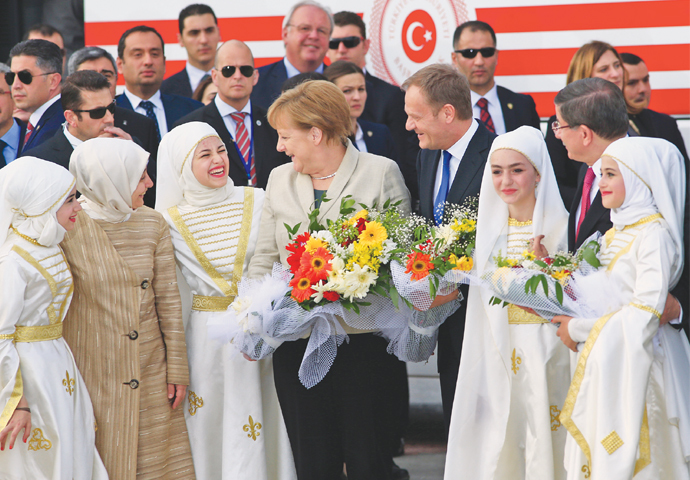
NIZIP: German Chancellor Angela Merkel visited a refugee camp on the Turkish-Syrian border on Saturday, kicking off a high-stakes visit aimed at boosting a month-old migrant deal plagued by moral and legal concerns.
Merkel, who was accompanied by European Council head Donald Tusk and European Commission Vice President Frans Timmermans, headed to the Nizip 2 camp near Gaziantep after touching down in the country’s south-east.
“Welcome to Turkey, the country that hosts the most refugees in the world,” read a huge banner hanging over the entrance to the camp, which hosts some 5,000 people in row upon row of white and beige prefabricated houses.
The aim of the visit is to promote the six-billion-euro ($6.7 billion) deal to return migrants arriving on Greek shores to Turkey, which has come under fire from rights groups, the UN refugee agency and some EU leaders.
The funds are aimed at helping Turkey improve conditions for the 2.7 million refugees it is hosting.
Diplomatic relations are strained following President Recep Tayyip Erdogan’s warning that the deal to curb the migrant flow to Europe would fall through if the EU did not keep up its end of the bargain by allowing visa-free travel for Turkish citizens. The bloc promised to present a visa recommendation on May 4 if Ankara complies with its side of the accord, but there has been growing unease in Europe over fears that security concerns are being fudged to fast-track Turkey’s application. US President Barack Obama on Saturday hailed Merkel’s “courageous” leadership in handling the Syrian refugee crisis.
But Hungary’s Prime Minister Viktor Orban said the EU had “sold out to Turkey” and the consequences were “impossible to predict”, adding: “The security of the European Union cannot be in the hands of a power outside the EU.” The success of the deal, which sharply reduced the number of people crossing from Turkey to Greece, was also called into question, with the International Organisation for Migration (IOM) saying the numbers were “once again ticking up”.
Published in Dawn, April 24th, 2016












































Dear visitor, the comments section is undergoing an overhaul and will return soon.